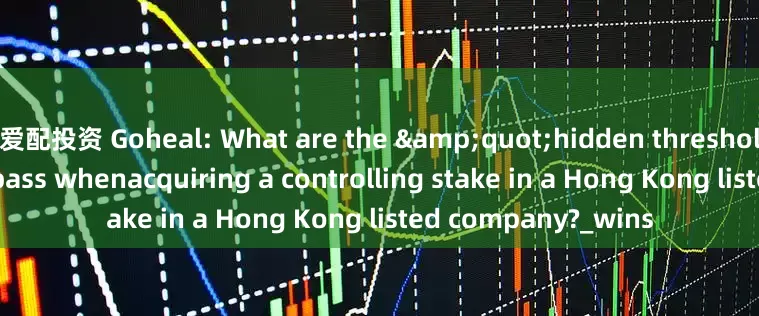
In the chessboard of the capital market, controlling stake mergers and acquisitions are not just "the highest bidder wins". Especially in the open and highly regulated Hong Kong capital market, if you want to acquire a controlling stake in a listed company, you must not only be able to bid a good price爱配投资, but also pass a series of "hidden thresholds" - resources and initiative are inside the door, and supervision, compliance and high accountability mechanisms are outside the door.
American Goheal M&A Group
展开剩余93%As a trader focusing on cross-border mergers and acquisitions, Goheal found that many investors still remain in the staged thinking of "talking about price first, then going through the process" for Hong Kong stock mergers and acquisitions. Little do they know that what really determines whether the transaction can be implemented is not the exquisiteness of the valuation model, but whether you understand the regulatory logic and practical strategies behind these invisible barriers.
The first threshold is the regulatory trap of "red line in front"
"A general tender offer must be launched if the shareholding exceeds 30%" - this is the most "hardcore" regulatory red line of the Hong Kong Stock Exchange in the eyes of many acquirers.
For example, a Chinese company increased its shareholding ratio from 28% to 31% in the Hong Kong stock market through continuous shareholding increase. It was immediately required to launch a comprehensive acquisition of all remaining shareholders. It either bought out everyone or took a step back. The cost of this "step" may turn the acquisition plan from profitable to huge losses. Goheal has assisted clients in designing the "walking zone" of equity ratios many times in actual cases, and avoided the cost out of control caused by "stepping on the line" through agreement arrangements, voting rights delegation, etc.
In addition, don't think that you can immediately become the "protagonist" by buying a controlling stake. If you inject assets and change your main business in a short period of time after taking control, the Hong Kong Stock Exchange may determine that you are "listing by backdoor listing" - once it is identified as a "reverse acquisition", you will not only have to meet the IPO standards again, but may also face trading suspension and information review, which is no less than the cost of going through the listing process again.
The second threshold is the "penetrating review" behind the funds.
Do you think financing is easy and you can do it in one go when the money arrives? No爱配投资, the Hong Kong Stock Exchange and the Securities and Futures Commission will ask you: "Where did this money come from? Is it in compliance with cross-border compliance?"
In many cases that Goheal has come into contact with, we found that the Hong Kong stock market's review standards for M&A funds are even higher than those of the A-share market. Not only do we need to check bank statements and foreign exchange filings, but we also need to review anti-money laundering reports, tax compliance, and the legality of capital entry. If the acquirer involves complex structures such as state-owned assets, funds, and family offices, it is also necessary to submit a penetrating report on the source of funds and relevant government approvals.
And if you plan to improve capital efficiency through leveraged buyouts, the Hong Kong stock market has rigid regulations on the "leverage ratio". It is usually required that the equity capital ratio is not less than 40% of the total price, otherwise it will face the continuous inquiry letters from the Securities and Futures Commission and the rights protection of small and medium shareholders. In many cases assisted by Goheal, we introduced placement funds through the "old first, then new" method to control the price, rhythm and ratio, thereby bypassing the rigid threshold of the placement floor price not less than 80% of the market price.
The third threshold is the "stabilizer" of the public shareholding ratio
Do you think that controlling shares can have the final say? Not really. In the Hong Kong stock market, controlling rights do not mean full control, at least you have to make the market "look like it".
According to the rules of the Hong Kong Stock Exchange, any listed company must maintain at least 25% of public shareholding. Once it falls below this ratio, it will not only face the risk of suspension, but may even be identified as "privatization intention" and questioned by the entire market.
Even more complicated is the mechanism of concerted action. If you and the former controlling shareholder of the target company signed some seemingly harmless agreements, or just controlled by the same investment fund, the Hong Kong Stock Exchange may regard you as "merged calculation", resulting in the "instant collapse" of the public shareholding ratio. At this juncture, Goheal often assists clients to stabilize the "market face" of the public shareholding ratio by introducing strategic investors to dilute shareholdings and using employee stock ownership platforms to balance voting rights.
The fourth threshold is the "operational minefield" after the transaction is completed.
Do you think that the transaction is completed after the delivery is completed? Wrong. You just walked into the door of your new home爱配投资, and the "minefield" at home has just started.
In Hong Kong's controlling rights transactions, shell companies are a "double-edged sword": they can take over the listing platform at a low price, but they often carry a large amount of hidden debts, unclear guarantees or historical lawsuits. Some acquirers ignored the target company's financial report notes for the past three years, and only found out that several hundred million yuan of contingent liabilities suddenly surfaced after the delivery. The restructuring plan must be revised and the acquisition cost soared by 30%.
Not to mention "license continuity". Are you buying a franchise company such as a brokerage, power, and environmental protection? Congratulations, you still have to talk to the regulator again. From Yaocai Securities to Ant Financial, many mergers and acquisitions tell us: Even if you buy a licensed company, the license still belongs to the regulatory approval, and it is not who controls who has the final say.
The fifth threshold is the "policy red line" for cross-border arbitrage
Want to take the placement shortcut through financing? Want to use Hong Kong stock policy arbitrage? The regulatory vision of the Hong Kong Stock Exchange is far sharper than you think.
The "old first, then new" mechanism is a major feature of Hong Kong stocks, which allows acquirers to quickly raise money on T+1 day. But don't forget, if you make major asset injections or structural adjustments within a year, the Hong Kong Stock Exchange will suspect that you are "building a shell". Mainland investors should pay special attention to the new foreign exchange regulations issued in 2024: if the amount of mergers and acquisitions exceeds US$100 million, additional antitrust explanation materials must be submitted, and the areas in the "Negative List of Market Access" cannot be involved.
Behind this is not only a compliance issue, but also a policy orientation. In an era of prudent supervision, the space for policy arbitrage is getting smaller and smaller, and the strategic path is the key.
This game really tests the ability to "set up a game"
Looking back on a successful Hong Kong stock merger and acquisition, data models and valuation negotiations are just preludes. What really determines victory or defeat is whether you can weave an "operation network" that can withstand compliance review and capital game between regulations, shareholder structure, market expectations and funding arrangements.
This is the core value of Goheal in cross-border acquisitions of controlling stakes. We are not a consulting agency that only does valuation models. Instead, we stand on the position of the "game maker" of mergers and acquisitions, and work simultaneously from the four dimensions of law, finance, market, and policy to ensure that the transaction goes from "negotiation" to "successful" and then to "defending".
Goheal Group
A typical acquisition of controlling rights in Hong Kong stocks takes an average of 8-12 months from project establishment to delivery, of which at least 40% of the time is spent on responding to regulatory inquiries, market communication, and program revisions. This is a complex chess game, and not every bidder can laugh to the end.
Conclusion: Next question, are you ready?
Every acquisition of controlling rights is an adventure like "walking on a tightrope". When funds, valuations, and markets are ready, can you steadily cross those "invisible thresholds"?
This is not only a test of financial strength, but also the ultimate challenge to the ability to "make a game".
The next time you consider acquiring a Hong Kong-listed company, you might as well ask yourself a question: Am I ready to enter this dual game of regulation and capital?
Welcome to leave a message for discussion. We are waiting for you in the comment area to discuss the best path for the next cross-border M&A.
[About Goheal] Goheal is a leading investment holding company focusing on global M&A holdings. It is deeply engaged in the three core business areas of listed company control acquisition, listed company M&A and restructuring, and listed company capital operation. With its deep professional strength and rich experience, it provides enterprises with full life cycle services from M&A to restructuring and then to capital operation爱配投资, aiming to maximize corporate value and achieve long-term benefit growth.
发布于:广东省益丰配资提示:文章来自网络,不代表本站观点。



